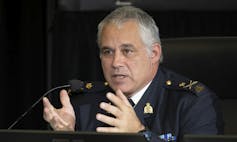
The RCMP has a problem when it comes to sexual abuse within the ranks — and it apparently lacks the ability to deal with it.
The Independent Centre for Harassment Resolution (ICHR) was established in 2021 following a landmark class-action lawsuit that resulted in the government paying more than $125 million to 2,304 female RCMP members who experienced sexual assault and harassment in the line of duty.
As an ostensibly arms-length body within the RCMP’s chain of command, its mission is to investigate workplace violence and related misconduct in the RCMP — although it so far seems to be failing to do so.
Since its inception, the ICHR has received more than 900 complaints from RCMP officers. Only 325 cases have been resolved, indicating serious process issues within the ICHR.
Complainants await justice
Plagued with delays and questionable decisions, the ICHR has left many complainants in limbo, creating uncertainty and a further loss of confidence. To alleviate this backlog, the RCMP’s leadership once proposed assigning Mounties to the ICHR to be investigators, showing a disturbing, unsurprising lack of adherence to the independent nature of the process.
Instead, the ICHR ended up outsourcing cases to contract investigators.
Mountie Nicole Patapoff has sought a federal court judicial review challenging the ICHR’s denial of her harassment complaint.
In June 2021, she alleges fellow officer Paul Christensen made misogynistic and degrading remarks to her during obligatory firearms training, telling her to “go home” and clean her house in order to strengthen her trigger finger. He also allegedly made comments about her appearance.
The ICHR dismissed Patapoff’s complaint, which her lawyers claim was unjustified and in violation the RCMP’s harassment criteria. The ICHR later told Patapoff that the person who investigated her complaint was removed from the list of approved investigators.
Culture of silence
Historically, allegations of sexual harassment, gender-based violence and bullying have plagued the RCMP.
The RCMP’s culture has been marked by a reluctance to acknowledge and address these issues, resulting in fear and silence among the rank and file. This culture of silence negatively impacts the mental health and well-being of its members — not to mention public trust.
Read more: The 'blue wall' of silence allows bullying, sexual abuse and violence to infect police forces
The RCMP is not alone. Canadian law enforcement has a dark history of actively ignoring and covering up sexual assault and misconduct.
An example is the case of Const. Nicole Chan of the Vancouver Police Department, who took her own life after years of bullying, harassment and sexual abuse by co-workers.
Read more: Behind the blue wall: The toxic culture that left a Vancouver police officer dead
Sadly, nothing is new here — time and time again, when left to police themselves, law enforcement agencies have mishandled these files and consequently lost the moral authority to govern themselves regarding sexual misconduct, bullying and harassment among their members.

In a 2020 report, former Supreme Court Justice Michel Bastarache exposed a corrosive culture within the RCMP that tolerates racist, homophobic and misogynistic attitudes. Despite this, there has been an unsettling silence and insufficient action to address these pervasive issues.
Inability to handle misconduct
When those designated with protecting the public become predators, the situation becomes dire. Alarmingly, the federal government continues to defer responsibility of investigating and disciplining bullying and sexual abuse to the RCMP, despite its manifest incapability to do so effectively.
The RCMP’s ICHR, despite its claim that it’s a “centralized, independent unit,” lacks a real arms-length distance, authority and oversight to make meaningful change.
In addition to perpetuating systemic abuse, this flawed system of oversight further tarnishes the RCMP’s reputation. Urgent, meaningful action is required, including delegating investigative and discipline authority far removed from the RCMP’s chain of command.
Public Safety Minister Marco Mendicino, like his predecessors, seems powerless to effect change. The RCMP seems incapable of policing itself and there’s next to no public oversight of its inaction.

RCMP commissioner Mike Duheme does not appear to prioritize these issues, and like his predecessor Brenda Lucki, there’s no evidence he has a meaningful plan to address the problem.
To date, he’s not commented on the biggest issue facing the force, while it should be his top priority. This indicates a systemic absence of leadership and suggests any commitment to institutional reform is mere lip service.
Reform urgently required
Real change must happen in terms of RCMP leadership.
That includes revising hiring practices to screen for offender pathology, including identifying what are known as the Dark Triad traits — narcissism, Machiavellianism and psychopathy — in a more comprehensive way to assess suitability, especially for those seeking leadership roles.
This could help avoid tragic outcomes and help ensure truly independent — and timely — investigations of misconduct complaints.
Read more: Brenda Lucki's retirement will not fix the RCMP’s structural problems
In addition to education and training on human rights, respect and accountability within the force, these reforms should be mandated with real consequences if they’re ignored, including replacing the RCMP’s leadership and charging accused offenders under the federal Police Act.

As Canada’s Chief Public Health Officer, Dr. Theresa Tam is mandated with addressing public health-related issues impacting Canadians. Tam can and should take a position on the public health implications of workplace violence and use her powers under the Health Act to effect change — yet she too remains silent, as do her provincial counterparts.
Establishing a National Commissioner for Workplace Violence would be another solution. This commissioner could operate independently from the archaic and ineffective measures in employment law, enforce public health orders concentrating on workplace violence, harassment and bullying, and have the authority to implement change in organizations across the country.
The RCMP’s ongoing issues with systemic misconduct and harassment and its inability to police itself necessitate immediate, bold and systemic measures. The welfare of its members and the Canadian public are at stake.
Jason Walker does not work for, consult, own shares in or receive funding from any company or organisation that would benefit from this article, and has disclosed no relevant affiliations beyond their academic appointment.
This article was originally published on The Conversation. Read the original article.







